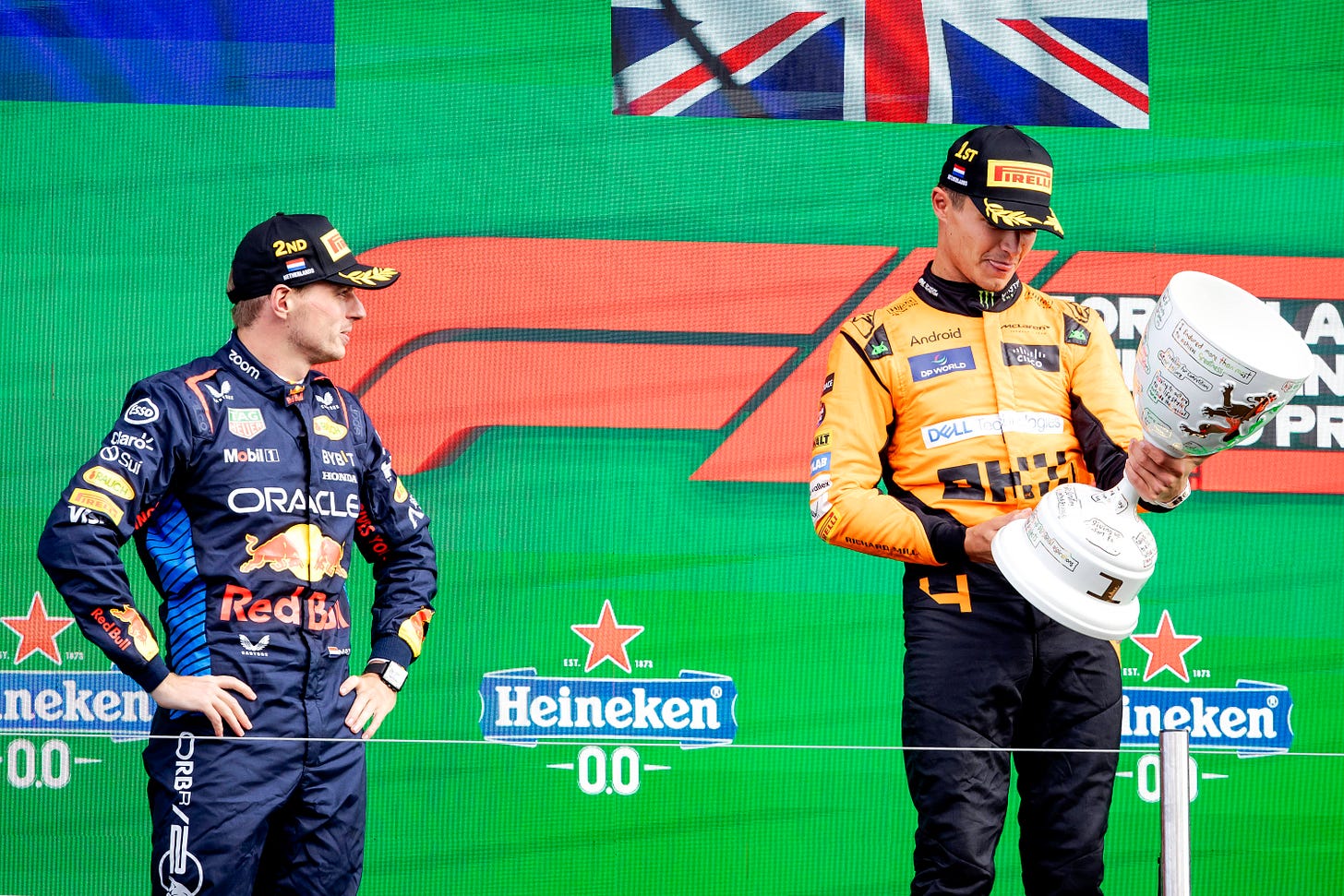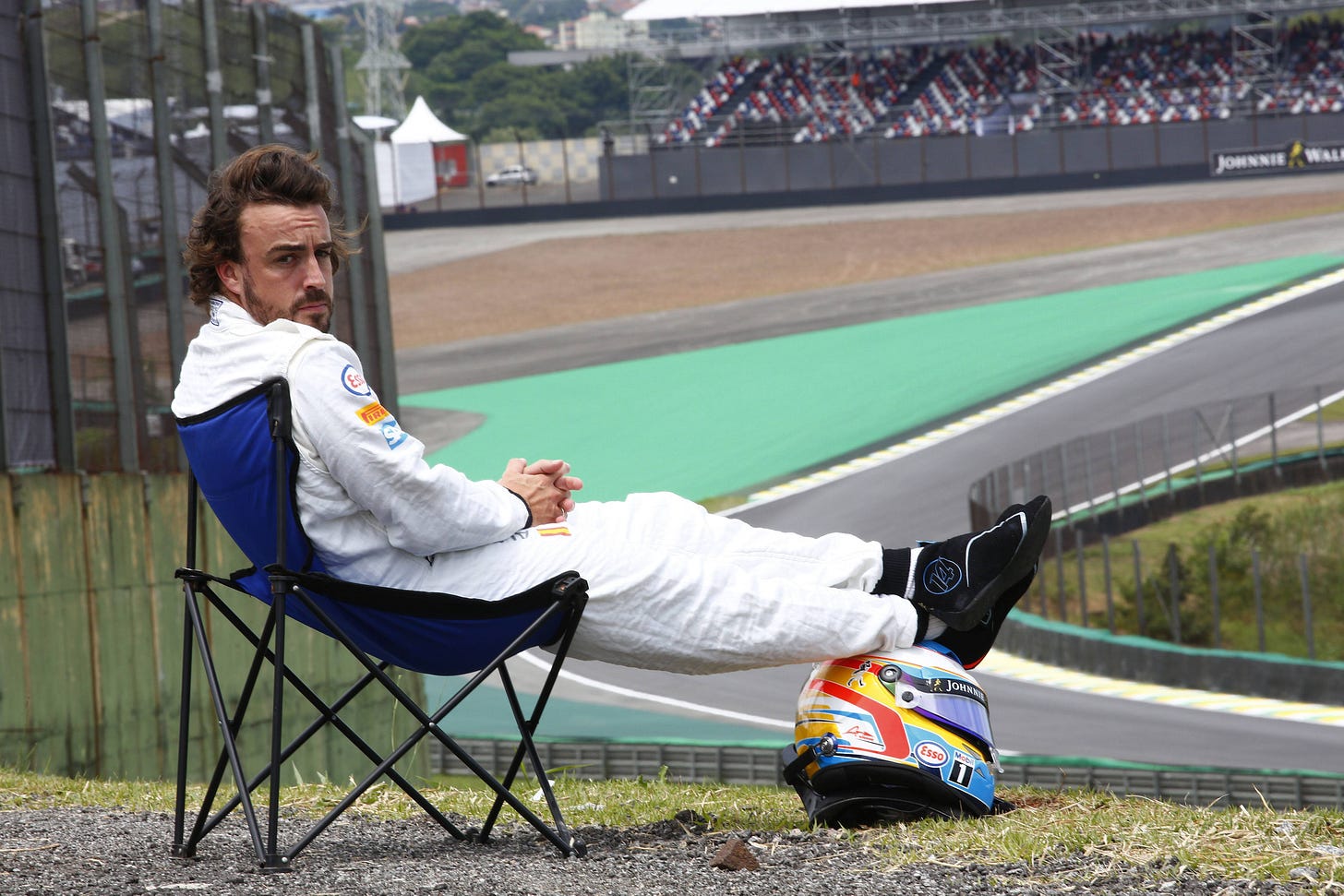How to lie about F1 (by using the truth): An expert's guide
Lying is fun. This is how to protect yourself from people who agree
Did you know that Lando Norris has been McLaren’s best driver this year, and should be the favourite to win the F1 drivers’ championship?
The numbers are clear. No driver on the grid has more poles this season than his four and, across sprint races and grands prix, nobody has climbed on the top step of the podium more often than him (six times).
You want more? In races that he and his team-mate Oscar Piastri have both actually finished, he’s collected the most points. You want consistency? When he hasn’t won, he’s finished six grands prix in second. He’s finished in the top two in 11 out of 14 non-sprint races this year, and nobody else has even done that 10 times.
It’s clear. Lando Norris is the worthy F1 world champion this year.
Except...I don’t really believe in anything I just said. It’s all true, you can run the numbers yourself, but as the economist Ronald Coase once said: ‘If you torture data long enough, it’ll admit to anything’. You might’ve heard a similar line espoused by Mark Twain, who attributed (erroneously, as far as anyone can tell) the line ‘there are three kinds of lies: lies, damned lies, and statistics’ to Benjamin Disraeli.
Pithy one-liners aside, you get what we’re doing here. And while we’re being transparent, this is not a new concept. The brilliant fantasy NFL analyst Matthew Berry points this out every year in his ‘100 Facts’ column and, while he might be the best at illustrating it, he’s far from the only one in far from the only sport.
The truth is, Lando Norris probably hasn’t been the best driver in 2025, and I (and the oddsmakers) have Piastri as favourite for the title. How did I lay out such a convincing case? Same as always – by picking and choosing which truths to tell.
‘No driver has more poles this season’ is true...but Piastri and Max Verstappen both match him exactly on four.
‘Across sprint races and grands prix, nobody has won more than him (six times)’. It’s true, but Piastri (again) has also taken the top step six times, and those were all in the vital grands prix – whereas one of Norris’ was in a sprint.
‘He has more points than Piastri in races they’ve both finished’. Yes, but the reason he didn’t finish in Canada was that he ran straight into the back of his team-mate because of a complete and catastrophic driver error. You can sneak that by a reader when you’re using it as one item in a list, but taken on its own it’s clearly an absurd argument.
So on, so forth.
The eagle-eyed of you will have noticed that I didn’t refute the one about the top-two finishes, because there’s not really a caveat to that one. But if I wasn’t writing about lies and honesty, I’d have skipped right over it and the chances are you’d never have noticed.
Why lie?
The intention here isn’t to help you all finesse your lying game so you can spread wild half-truths online, but to help you spot when other people are doing it.
Say you’re a regular on f1twt and you’re getting fed posts left, right and centre from different fan accounts explaining why the driver they like is underrated, or better than their teammate, or next year’s breakout candidate. It’s an information overload. This column isn’t designed for you to spot which ones to pay attention to and which ones to ignore – it’s designed for you to recognise that there’s really no such thing as a context-free stat in F1, and that you should be careful taking anything that’s presented as a numerical fact at face value.
It isn’t just fans online who do this, either. In the media, the last thing anyone wants to hear from you is ‘well, these drivers are good, but so are these ones, we’ll see at the end of their careers how they’ve shaken out and we can judge them then’. It’s our job to shape the narrative and, sometimes, that means saying something that you absolutely believe to be true...but have to reach a little to ‘prove’.
You’re welcome to a demonstration. Here’s an extract from a piece I wrote earlier this month about Gabriel Bortoleto being the most impressive rookie of the 2025 season.
With his seventh place in Hungarian Grand Prix qualifying (ahead of Max Verstappen and the Racing Bulls, if you're keeping track), he extended his qualifying head-to-head lead over Nico Hulkenberg to 8-6 (plus 2-1 in sprint qualifying).
As it happens, I do think that Bortoleto is the most impressive of the rookie class, and I sincerely believe that the stat I quoted proves that.
Equally, I’m very aware that Hulkenberg is ninth in the championship with 37 points, while Bortoleto is 17th with 14. I know that, I just chose not to mention it, because it would’ve undercut my point. I don’t feel bad about that – partly because I’m not trying to mislead you (I really do believe that about Bortoleto), but mostly because I’m not doing anything that any other writer on this planet isn’t doing.
This isn’t about writers having agendas, and it’s certainly not about anyone having an agenda against your favourite driver specifically unless it’s [name redacted], it’s just how human brains work.
As soon as a statistic is used to prove a point, it ceases to exist in a vacuum, and it ceases to be objective. We don’t try to lie to you. It’s just that we can’t help it.
Just one thought to leave you with. Lewis Hamilton is Ferrari’s best ever driver in sprint races, after taking the team’s only ever sprint win in Shanghai this year. Also, Carlos Sainz’s average sprint finish of 4.47 for the team compared to Hamilton’s average of 6.33 makes him the best ever sprint racer for Ferrari, comfortably better than the seven-time champion.
Truth is truth. But which truth you use is up to you.





The type of sports writing that used to be prevalent but is now unicorn in nature. Top class